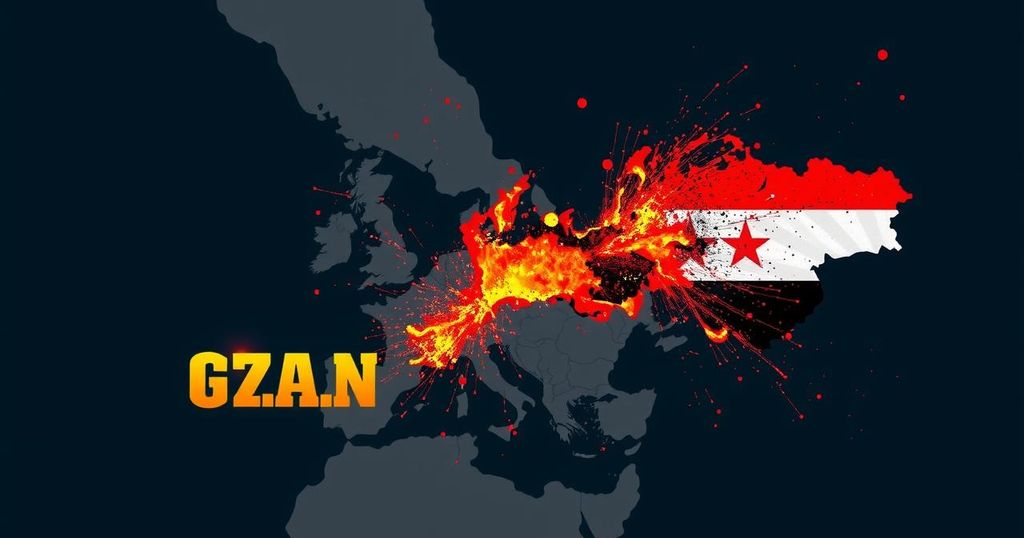Global news
’ EL ALZAYAT, ASIA, CONFLICT, EMGA, EUROPE, FOREIGN POLICY, GAZA, GAZA CONFLICT, GAZA STRIP, ISRAEL, ISRAEL-HAMAS CONFLICT, KANTARAWADDY TIMES, KANTARAWADDY TIMES SEIN WIN, MIZZIMA, MONDOWEISS, NORTH AMERICA, SAM, STATES, THE WASHINGTON POST, UKRAINE, UNITED STATES, WA, WA ’ EL ALZAYAT, WAR, WHITE HOUSE
Leila Ramsay
0 Comments
The Impact of the Gaza Conflict on the U.S. Electoral Landscape
The upcoming U.S. presidential election is significantly influenced by voter reactions to the Gaza conflict, with many Arab American voters shifting their support from the Democratic Party towards Donald Trump. This realignment poses challenges for the Democratic electoral strategy and reflects broader implications for U.S. foreign policy. Various media outlets navigate a complex political environment as they refrain from endorsing candidates ahead of a contentious election.
As the United States presidential election approaches, the political landscape has become increasingly volatile, particularly due to the ongoing conflict in Gaza. Arab American voters, traditionally aligned with the Democratic Party, are expressing disillusionment with the Biden administration’s support for the Israeli military actions, leading many to contemplate a shift towards Donald Trump. This unexpected realignment has instigated significant concern within the Democratic Party regarding its electoral strategies and voter outreach efforts. The ramifications of these changing voter sentiments reach further, as there is speculation about how the election results may influence U.S. foreign policy in regions such as Gaza, Ukraine, and Sudan. As various media outlets prepare for a potential Trump presidency, they face the challenge of navigating this complex political terrain without endorsing a candidate, citing the need for neutrality. Furthermore, individual narratives from impacted communities, such as the heart-wrenching account of a loss endured during the Gaza conflict, accentuate the personal stakes involved in this election. The experience and perspectives of communities affected by international crises are becoming increasingly central to the election discourse, shedding light on the profound implications of U.S. foreign policy for domestic voters. In this charged environment of emotions and shifting allegiances, the upcoming election is not merely a choice between two candidates but a defining moment that will inevitably shape America’s role on the global stage and its relationship with diverse communities within the nation.
The current situation regarding the Gaza conflict has transcended beyond its immediate geographical implications, extending its influence into the U.S. electoral arena. Arab American voters, who have historically leaned towards the Democratic Party, are now reassessing their allegiances in light of the Biden administration’s foreign policy decisions regarding the conflict. As these voters reconsider their options amidst the backdrop of military actions in Gaza, the implications for the Democratic Party’s electoral prospects become markedly significant. The specter of a potential Trump victory adds urgency to this reassessment, highlighting the complex interplay between domestic and foreign policy issues in the hearts and minds of voters.
In conclusion, the ongoing conflict in Gaza has emerged as a pivotal factor influencing voter behavior in the upcoming U.S. presidential election. The discontent among Arab American voters towards the Biden administration’s policies is prompting a reevaluation of traditional party loyalties, which could hinder the Democratic Party’s prospects. This dynamic underscores the importance of recognizing how foreign policy impacts domestic electoral outcomes and the necessity of addressing the concerns of diverse voter groups.
Original Source: www.aljazeera.com




Post Comment